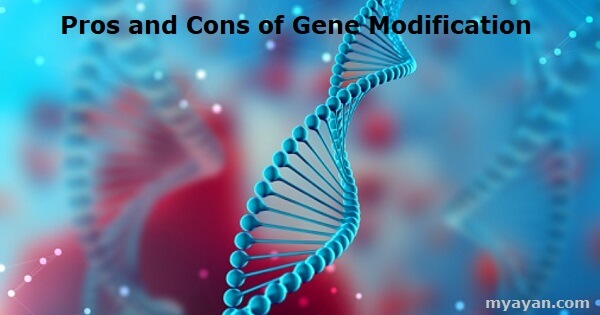The process of purposefully altering an organism's DNA sequence is called gene modification. It may be accomplished in some ways, including genetic engineering methods like CRISPR/Cas9, which let researchers edit or delete particular genes from an organism's DNA.
Gene modification can be used to create crops resistant to pests or environmental challenges, produce novel medications to cure genetic illnesses, or change animals for use in scientific study, among other things.
Finding the specific gene or genes of interest, creating and synthesizing a DNA sequence that will replace or change the current gene, and then delivering the new DNA sequence into the organism's cells are the steps in the gene modification process.Although there may be numerous advantages to gene modification, there are also ethical concerns concerning its use, particularly in light of the possibility of unforeseen consequences or the development of genetically modified organisms that may negatively impact the environment or human health.
Gene alteration may have the following benefits:
Genetic disorders, including cystic fibrosis, sickle cell anemia, and Huntington's disease, can be prevented using novel medications and treatments developed by gene editing. Additionally, it may be utilized to create brand-new medications that target certain genes or disease-related gene circuits.
Through the application of gene editing, it is possible to produce crops that are resistant to pests, diseases, and environmental challenges like drought or high temperatures. The requirement for pesticides and other chemicals may be decreased while crop yields may improve as a result.
Gene modification can produce organisms that can degrade or remove environmental contaminants, such as oil spills or hazardous compounds in soil, through bioremediation.
Through gene editing, it is possible to produce animals that are more resilient to disease, have better meat quality, and produce more milk.
Gene editing can produce animal models of human diseases, enabling scientists to investigate the illness in a controlled setting and potential test remedies.
It is crucial to remember that gene alteration raises ethical and environmental issues. Therefore, its use and any repercussions should be carefully considered.
There are some possible drawbacks to gene modification as well.
Ethics: Using gene modification raises ethical questions, especially when changing human embryos or producing genetically altered species that could have unexpected effects.
Gene modification can have unforeseen environmental effects, such as transferring changed genes to wild populations or the emergence of superweeds or pests that are immune to insecticides.
Gene editing techniques can potentially have off-target effects or unforeseen outcomes, raising concerns about the dangers to human health.
Our knowledge of genetics and the possible effects of gene editing is still limited. Thus, there is a chance for unintended or unexpected effects on human health or the environment.
If gene modification is only available to those who can afford it or is used to foster new types of inequality or discrimination, it may worsen existing social and economic disparities.
Gene modification has the potential to be quite beneficial overall, but it is crucial to carefully assess its use and any negative effects before moving further.
Conclusion
In conclusion, gene modification is an effective technology with the potential to significantly advance several industries, such as agriculture, medicine, and environmental restoration. However, gene modification also has hazards in terms of ethics, the environment, and human health, and its long-term effects are yet not completely known.
As a result, it's crucial to approach gene alteration with prudence and give its possible advantages and hazards due thought. Regulation and supervision are crucial to guarantee that gene modification research and usage are conducted safely and ethically and that everyone may benefit from its advantages. In the long run, ethical gene modification might result in enormous improvements in human health and well-being and fair, sustainable solutions to some of the planet's most serious issues.

The deliberate alteration of an organism's DNA sequence is called gene modification or genetic engineering. It may be accomplished via various methods, including gene splicing or the CRISPR/Cas9 system, to add, delete, or change certain genes.
Potential applications for gene editing include healthcare, agriculture, and environmental cleanup. It may be used to discover novel medicines and cures for hereditary illnesses, construct pest- and stress-resistant crops, and raise healthier and more productive livestock.
Gene manipulation raises ethical questions when it comes to changing human embryos or generating genetically altered species that can have unforeseen effects. Gene modification may also impact the environment, human health, and social and economic systems.
Depending on the nation and location, gene manipulation has different laws. Generally speaking, severe ethical, environmental, and safety restrictions govern gene modification research and usage.
New cures and treatments for genetic illnesses, including cystic fibrosis, sickle cell disease, and Huntington's disease, are being developed in medicine via gene editing. It is also utilized to develop animal models of certain conditions to investigate human diseases in a controlled setting and test potential remedies.
Gene modification is used in agriculture to create crops resistant to pests, diseases, and environmental difficulties like drought or extreme temperatures. Crop yields may increase while the need for pesticides and other chemicals may reduce.